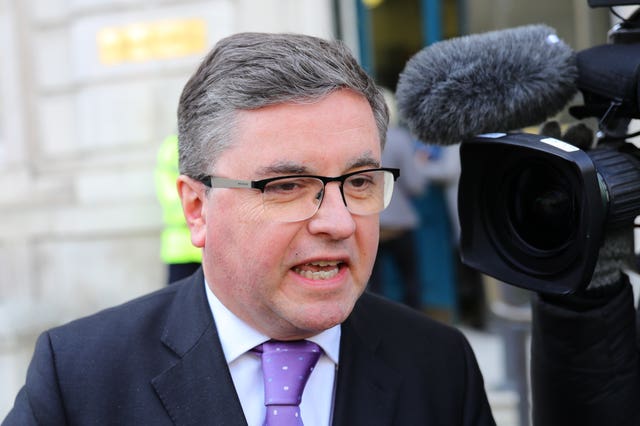
Up to 4,000 prisoners in England and Wales are to be temporarily released from jail in an effort to try and control the spread of coronavirus.
The Ministry of Justice (MoJ) said the selected low-risk offenders will be electronically tagged and temporarily released on licence in stages, although they can be recalled at the first sign of concern.
It is seen as a way to avoid thousands of prisoners, many of whom share cells, from becoming infected.
The move comes as 88 prisoners and 15 staff have tested positive for Covid-19.
No high-risk criminals – such as those who have been convicted of violent or sexual offences, anyone who is a national security concern or a danger to children – will be considered for release.
Prisoners who have not served at least half their custodial term will also not be among those who are released.
The MoJ also said no offender convicted of Covid-19-related offences, including coughing at emergency workers or stealing personal protective equipment, will be eligible.
Lord Chancellor and Justice Secretary Robert Buckland QC said: “This Government is committed to ensuring that justice is served to those who break the law.
“But this is an unprecedented situation because if coronavirus takes hold in our prisons, the NHS could be overwhelmed and more lives put at risk.
“All prisoners will face a tough risk assessment and must comply with strict conditions, including an electronic tag, while they are closely monitored.
“Those that do not will be recalled to prison.”
The MoJ also said no prisoner would be released if they have symptoms of coronavirus or without housing and health support being in place.

The legislation for these measures to take place is set to be laid on Monday.
The Prison Officers’ Association believes it will relieve the pressure on frontline staff and the crowded prison system which “could be the difference between life and death during this pandemic,” according to general secretary Steve Gillan.
National chairman Mark Fairhurst said: “It is essential that those being released pose no risk to the public and get tested for Covid-19 prior to release. Victims of crime should not be forgotten when such decisions are made and a balance must be struck between the safety of staff and the general public”.
Juliet Lyon, chair of the Independent Advisory Panel on Deaths in Custody, welcomed the move as it comes “at a time of grave threat to life” while Campbell Robb, chief executive of the social justice charity Nacro, described it as “a sensible step forwards”.
Prison Reform Trust director Peter Dawson said: “Exceptional times require exceptional measures, and the public should be reassured that in this instance their protection is better served by carefully releasing some prisoners a few weeks early than by keeping them in.
“Prisons have never faced an emergency of this complexity or duration, and further measures will be needed in the weeks ahead.”
Earlier this week, Mr Buckland announced that pregnant inmates could be granted temporary release from prison “within days” to protect them and their unborn children from coronavirus.
Prison governors will be able to grant release on temporary licence to women who are expecting behind bars as long as they do not pose a high risk of harm to the public.
Decisions will be made subject to them passing risk assessments and once suitable accommodation is found.
Mothers who are behind bars with their children who pass the same checks can also be released.
Northern Ireland is to release 200 of its 1,500 prisoners early while the authorities in Scotland are considering taking similar action.
There are 5,000 prisoners in France who are to be released early, along with 3,500 just in the US state of California.
Australia, Germany, and Canada have already given the go-ahead for the early release of prisoners.
Ethiopian authorities announced on Saturday they would drop charges and pardon 2,558 prisoners, bringing the total number of prisoners pardoned in the country since the outbreak to 5,600.
Meanwhile Iran has temporarily released 85,000 prisoners, according to reports, and is set to pardon up to 10,000 more.
Those released in Iran include Nazanin Zaghari-Ratfcliffe, the dual British-Iranian national arrested four years ago while visiting family and later sentenced to five years in jail over allegations, which she denies, of plotting to overthrow the Tehran government.


Comments: Our rules
We want our comments to be a lively and valuable part of our community - a place where readers can debate and engage with the most important local issues. The ability to comment on our stories is a privilege, not a right, however, and that privilege may be withdrawn if it is abused or misused.
Please report any comments that break our rules.
Read the rules hereLast Updated:
Report this comment Cancel